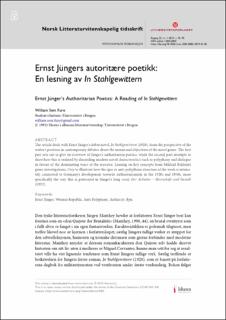Ernst Jüngers autoritære poetikk: En lesning av In Stahlgewittern
Journal article, Peer reviewed
Published version

View/
Date
2019-04-03Metadata
Show full item recordCollections
- Master theses [243]
- Registrations from Cristin [10402]
Original version
10.18261/issn.1504-288X-2019-01-05Abstract
The article deals with Ernst Jünger’s debut novel, In Stahlgewittern (1920), from the perspective of the writer’s position in contemporary debates about the means and objectives of the novel genre. The first part sets out to give an overview of Jünger’s authoritarian poetics, while the second part attempts to show how this is realised by discarding modern novel characteristics such as polyphony and dialogue in favour of the dominating voice of the narrator. Leaning on key concepts from Mikhail Bakhtin’s genre investigations, I try to illustrate how the epic or anti-polyphone structure of the work is intimately connected to Germany’s development towards authoritarianism in the 1920s and 1930s, more specifically the way this is portrayed in Jünger’s long essay Der Arbeiter – Herrschaft und Gestalt (1932).
